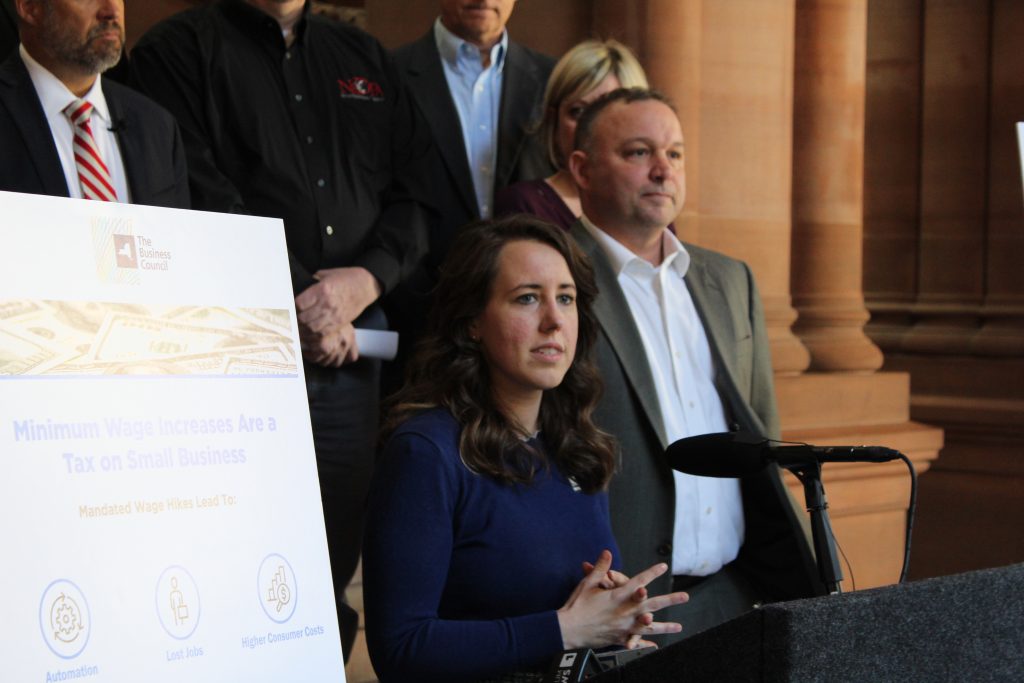
Ashley Ranslow, New York state director of NFIB, speaks during a press conference in the Capitol.
Following the economic impacts of the COVID-19 pandemic, lawmakers in Albany are pushing for the “Raise the Wage Act” (S.1978-A/A.2204-A) that would adjust the minimum wage rate annually based on the rate of inflation, which could push the minimum wage standard upwards of $20 within the next five years.
The National Federation of Independent Businesses organized a press conference in the Capitol on March 22 to outline how a wage increase could have a detrimental impact on New York’s economy, and even have a reverse effect on the working-class individuals who legislators are trying to support.
“If they increase the minimum wage, that money is not coming from the New York state budget. That money is coming from businesses,” said Ashley Ranslow, New York state director of NFIB. “So you could make the argument that if New York state addressed the Unemployment Insurance debt, that’s a lot of money businesses would be saving and they could pay their people more on their own. But New York is forcing businesses to pay all of this extra money in taxes. That’s money that they can’t use for other business purposes, whether that’s adding to their benefits, paying people more, growing, investing their business, or expanding their business.”
When former Gov. Andrew Cuomo mandated that all non-essential businesses shut down after COVID-19 hit New York in late March 2020, the state only had $2.7 billion in its Unemployment Insurance Trust Fund, but with more than two million jobs lost, the state had to borrow billions of dollars from the federal government. In order to pay back the now $8.1 billion that the state owes to the federal government, businesses are still being taxed 3.4% on their annual income and since that $8.1 billion will not be paid back in full by the end of 2023, that number is very likely to go up due to the insurance rate on the loan — putting even more stress on small business owners.
“At this point in time, we have not seen any concrete proposals that would address the crushing taxes that are being levied against small businesses or from the state and federal government as well as interest assessments,” Ranslow said at a recent press conference in the Capitol. “ I also want to make mention that New York recently put out a study that shows since 2016, 40% of manufacturers have increased automation in factories and it is directly linked and correlated with companies looking to cut labor costs. And by just cutting jobs, raising prices, this has an impact not only on small businesses in every community in their state, but on the U.S. economy.”
The minimum wage in the state of New York is now at $14.20 an hour, meaning that a person earning minimum wage at an entry level job would be earning $29,536 per year. According to a study done by the Massachusetts Institute of Technology a “livable wage” for average New Yorkers would have to be at least $25.65 per hour — just for a single income household with no dependents. Since the minimum wage rate stays the same regardless of how many dependents an individual may have, many people who have an entry level position with the current minimum wage rate can barely support themselves let alone whoever else they may have to support on their salary.
“We want the urgency of the moment to be taken seriously,” said Sen. Jessica Ramos back in November when she first introduced the “Raise the Wage” Act. “We’re hoping that the minimum wage is raised as soon as we get into legislative session come January so that we can help more working families keep a roof over their heads and catch up on their bills.”
In January, Gov. Kathy Hochul unveiled her proposed budget for the 2023-2024 fiscal year which stated that she intends to index the minimum wage to the inflation rate and give an extra $38 million to support minimum wage increases.
There is nothing in the budget that addresses the $8.1 billion Unemployment Insurance debt.









